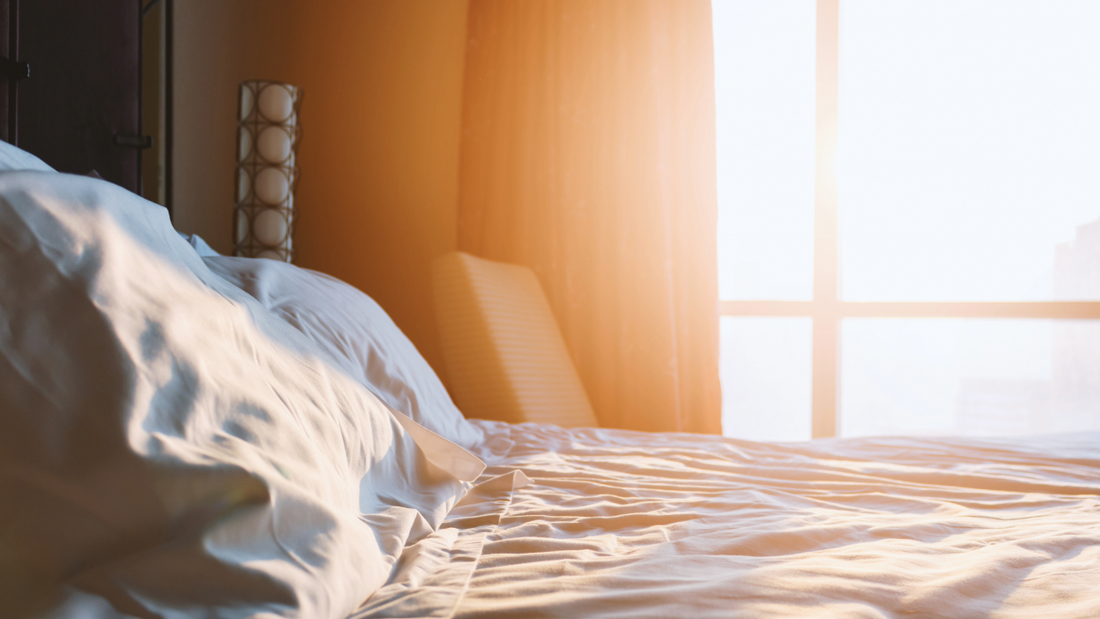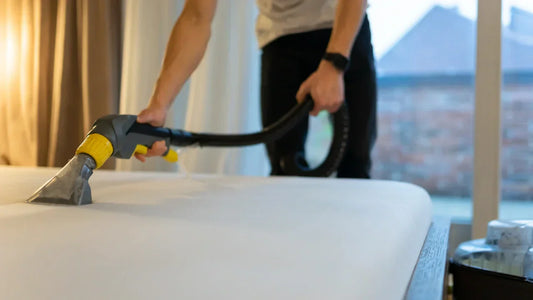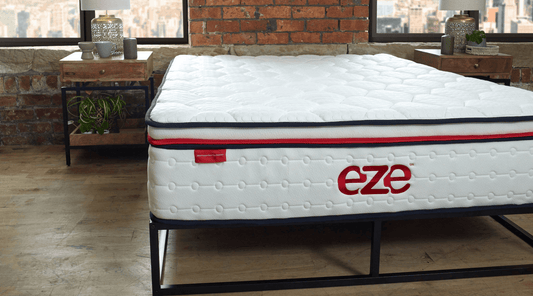We know how it is. You’re tired but restless, your body’s exhausted but your mind has other plans or maybe the kids have woken you up. You are not alone, as a nation we are more sleep deprived than ever, and you probably wish there was a way to get a bit more sleep.
Better sleep has a big impact on our daily lives (more energy, happier relationships, better skin and improved mood) and reduces the risk of obesity, type-2 diabetes and Alzheimer’s disease. With that in mind here are our top tips to get a better night’s sleep all year round.
Here are some straightforward lifestyle changes you can make to your day if you are finding it difficult to get a good night’s sleep, recover and feel refreshed.
1. Wake up to a bright light

Wake up to bright natural light every morning. Open the curtains wide, preferably a rear window with a garden view rather than of the road, or go out for a walk - perhaps as part of your commute. You sleep better at night when your body is exposed to bright light in the morning and dim lights before bed as it helps reset your body’s circadian rhythm.
2. Prepare your bedroom

Having a room with an orange and red colour palette can be a bold option to wake-up to, mimicking sunset however if it stops you calming down on a night opt for softer colours. A study by Travel Lodge favoured sleeping in a blue decorated bedroom to get the most ZZz’s. Keep greens, blues, grays, and neutrals in mind when picking artworks, colours for your bedding, carpet, walls, and blinds. Investing in black-out curtains can be a life-saver if you have lots of street lights adjacent to your bedroom. A more minimal colour palette should help soothe you into the mood for sleep and reducing clutter will help your brain find calm. The ideal temperature of your bedroom should be 15.5 to 19.4 degrees to avoid waking and disturbed sleep during the night.
3. Avoid blue light from screens and LEDs
 Turn off all your devices such as laptops, smartphones and tablets around 90 minutes before going to bed as blue light from the screen can have a stimulatory effect. Your body releases the all-important sleep hormone melatonin after dark, the light from these devices can disrupt your ability to fall asleep. Reading a book or magazine before bed will also help you relax far more than another episode of Game of Thrones or glance at Instagram. If you must use a device consider purchasing a pair of blue-light-blocking glasses. If you can’t sleep get out of bed and try taking your mind off of your inability to sleep, laying in bed awake can upset your bedtime routine.
Turn off all your devices such as laptops, smartphones and tablets around 90 minutes before going to bed as blue light from the screen can have a stimulatory effect. Your body releases the all-important sleep hormone melatonin after dark, the light from these devices can disrupt your ability to fall asleep. Reading a book or magazine before bed will also help you relax far more than another episode of Game of Thrones or glance at Instagram. If you must use a device consider purchasing a pair of blue-light-blocking glasses. If you can’t sleep get out of bed and try taking your mind off of your inability to sleep, laying in bed awake can upset your bedtime routine.
4. Choose a mattress that works with your sleep position

Have you ever thought about how your sleeping position may be affecting your sleep? You could benefit from a better position that enhances your sleep. If you remain in a position for hours at a time that puts a kinck in your neck, numbs your arm or hip, it takes a toll. It can lead to greater sleep movement and less deep sleep ultimately leading to a feeling of low energy. Recent studies suggest that there is a connection between our sleep and personalities on a very basic level. Chris Idzikowski, PhD, a director of the Sleep Assessment and Advisory Service in London, and author of Learn to Sleep Well, says that “If you sleep in a bad position, you’re more likely to be grumpy the next day.” as reported by WebMD.
5. Allow your body time to recover

Modern life is stressful, you might be looking for a new job, juggling a busy commute and family life whilst still trying to get a hard workout in a few times a week. A gentle amount of stress can help motivate us to get things done and be productive. However trying to do too much at once can be counter-productive and lead to anxiety and poor sleep. You can probably do a monster gym session but before you do, consider the bigger picture and how your stress levels as a whole are. A simple way you can upgrade your sleep is by choosing a mattress designed for recovery to help support and rejuvenate tired muscles. Good sleep recovery will ensure you wake up ready for another hard day of training.
6. Cut out the late-night fridge raids
 If your stomach starts to rumble on an evening it might be best to ignore it. Fatty foods and sugary snacks can kick-start your digestive system making it harder to fall asleep. A recent study shared by Very Well Health showed how eating too soon before bed can decrease energy levels throughout the next day as it disrupts the body’s circadian rhythm.
If your stomach starts to rumble on an evening it might be best to ignore it. Fatty foods and sugary snacks can kick-start your digestive system making it harder to fall asleep. A recent study shared by Very Well Health showed how eating too soon before bed can decrease energy levels throughout the next day as it disrupts the body’s circadian rhythm.
7. Have a better diet
 If your stomach starts to rumble on an evening it might be best to ignore it. Fatty foods and sugary snacks can kick-start your digestive system making it harder to fall asleep, try to cut out the late-night snacks where possible and introduce pasta and potatoes in to your evening meal to get the benefits from tryptophan. If you really must eat before bed some minerals found in foods can help improve your sleep. Next time you get hungry before bed reach for one of these:
If your stomach starts to rumble on an evening it might be best to ignore it. Fatty foods and sugary snacks can kick-start your digestive system making it harder to fall asleep, try to cut out the late-night snacks where possible and introduce pasta and potatoes in to your evening meal to get the benefits from tryptophan. If you really must eat before bed some minerals found in foods can help improve your sleep. Next time you get hungry before bed reach for one of these:
- Low-fat yoghurt
- Bananas
- Berries
8. Change your mattress

When did you buy your mattress? Chances are you’ve had it for more than five years. That’s not too bad, our mattresses come with a ten year eze™ guarantee and most mattresses will last if you give them a good pat down. However, if you start to notice any lumps, sagging, or you feel a protruding spring it could be the cause of your upset sleep.
Before purchasing a new mattress ask yourself if it is firm enough, mattresses ‘give’ a little, becoming a touch softer after a few weeks but anything too stiff can not be supportive enough for your spine. Invest in a mattress that supports your sleep position.
9. Find your zen
After the hustle and bustle of a modern day it’s no wonder why people are turning to thousand-year-old techniques to find calm. They worked back then and today tech entrepreneurs and athletes are using these tips to ensure they maintain mental clarity and focus.
“Bring your mind home to your body, and perform the miracle of walking on Earth.”
- -Thích Nhất Hạnh
-
Practice mindfulness meditation - that helps us recognise the conditions of happiness that we already have in our daily lives and be more thankful and content
-
Guided Imagery - focus your mind on imagery or a story that will help your mind relax
-
Breathing techniques - Try the 4-7-8 technique, recommended by Dr Andrew Wail which can bring a profound sense of relaxation.
- Sound meditation - There are a number of apps available such as Sleepiest, which offers calming sounds, e.g. of the Scottish Highlands to help you drift of including babbling brooks, bird song and some gentle melodic noise for the background. Millions of people use the app to get a good night’s sleep.
Guided meditation - Apps like Calm bring meditation to the masses with hundreds of hours of guided meditation covering anxiety, stress, sleep and more.
10. Make it a habit
 All of the factors above show how having a reserved time for sleeping and a sleep position that suits your sleep habits can help you achieve a good night’s sleep and wake up feeling rejuvenated.
All of the factors above show how having a reserved time for sleeping and a sleep position that suits your sleep habits can help you achieve a good night’s sleep and wake up feeling rejuvenated.
It’s not just the kids that need a routine! We’re living busier, harder lifestyles and as adults we can benefit just as much from a bedtime routine that will help us drift off into relaxing and restorative sleep.
We challenge you to try some of these straightforward lifestyle changes that you can make during the day: getting up early and exercising, say no to caffeine after 2pm, avoid heavy meals after 7pm, cut back on boozy beverages, avoid using computers before bed, eat healthier and sleep on a mattress that will support your sleep position and give you the comfort you need to get properly recovered.
Let us know how this goes for you using the hashtag #ezenights we would love to hear from you!
Sources
- https://www.ncbi.nlm.nih.gov/pubmed/28487255
- https://www.verywellhealth.com/eating-before-bed-3014981
- https://www.webmd.com/sleep-disorders/best-sleep-positions#1
- https://www.travelodge.co.uk/press-centre/press-releases/SECRET-GOOD-NIGHT’S-SLUMBER-SLEEP-BLUE-BEDROOM
- https://www.bbcgoodfood.com/howto/guide/how-get-good-nights-sleep
- https://drchatterjee.com/4tipsforsleep/









